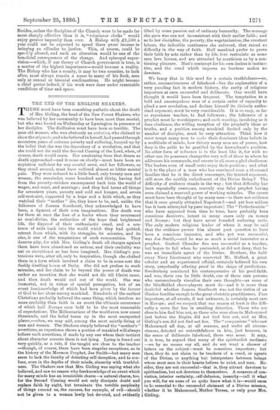THE END OF THE ENGLISH SHAKERS. lifted by some passion
out of ordinary humanity. The message she gave was one not inconsistent with their earlier faith ; and as to her discipline, the poverty, the vegetarianism, the constant labour, the inflexible continence she enforced, that raised no difficulty in the way of faith. Half mankind prefer to prove their faith by acts rather than by life, love restraints as some men love license, and aro attracted by asceticism as by a con- tinuing pleasure. Man's contempt for his own desires is instinc- tive, and the creed which imposes no burdens makes no devotees.
We fancy that in this need for a certain truthfulness—or, rather, unconsciousness of falsehood—lies the explanation of a very puzzling fact in modern history, the rarity of religious imposture at once successful and deliberate. One would have thought it would have been frequent. The temptation to a bold and unscrupulous man of a certain order of capacity to plead a new revelation, and declare himself its divinely autho- rised exponent, must be very considerable. It is so easy, as far as experience teaches, to find followers ; the followers of a prophet must be worshippers ; and such worship, involving as it does obedience, the willing reception of the prophet's ideas as truths, and a position among mankind limited only by the number of disciples, must be very attractive. Think how it must tempt many men to 7na1ce their dominant ideas beliefs in a multitude of minds, how thirsty many men are of power, how deep is the pride to be gratified by the hierophant's position. No other form of influence is in the least like it, for with no other can its possessor change the very will of those to whom he addresses his commands, and ensure in all cases a glad obedience. The leaders even of small sects enjoy their position ; and what is it to the place of a man who has convinced even a thousand families that he is the direct messenger, the trusted exponent, still more the earthly embodiment of the Divine Being ? The difficulty of evidence stands in the way ; but that difficulty has been repeatedly overcome, scarcely any false prophet having even claimed a reserved power of working miracles. The career must have been thought of by many men—is there not evidence that it once greatly attracted Napoleon P—and yet how seldom has it been attempted by pure impostors ! The " Perfectionists " who have appeared from time to time, have probably been conscious deceivers, intent in many cases only on money and license ; but they have never founded enduring sects. The only modern religious leader of whom it may be said that the evidence proves him almost past question to have been a conscious impostor, and who yet was successful, was Joe Smith,—and he was as much a social innovator as a prophet. Keshub Chunder Sen was successful as a teacher, but began to fail when he pretended, or did not deny, that he was an immediate agent of the Divine. Brothers, the half- crazy Navy Lieutenant who converted Mr. Halhed, a great scholar and an experienced official, certainly believed his own story, perpetually offering proof in the shape of predictions. Swedenborg convinced his contemporaries of his good-faith. and was, there can be little doubt, one of those rare persons who unconsciously visualise their own thoughts—as some of the blindfolded chess-players must do—and it is more than doubtful whether Joanna Southcott was not the victim of an illusion familiar enough to the great obstetric practitioners. Pare imposture, at all events, if not unknown, is certainly most rare in Europe; and we suspect that one reason at least is the diffi- culty a mere liar has in avoiding detection. Those who are close to him find him out, as those who were close to Mahommed just before the Hegira did not find him out, and as Mrs. Girling's son did not find out her. The" companions" who saw Mahommed all day, at all seasons, and under all circum- stances, detected no untruthfulness in him, just because, in the sense of deliberate falsehood, there was none. It may, it is true, be argued that many of the spiritualist mediums —we by no means say all, and do not want a shower of letters on the subject—must be conscious impostors ; but then, they do not claim to be teachers of a creed, or agents of the Divine, or anything but interpreters between beings whom most men in their hearts believe to exist, and men. Be- sides, they are not successful—that is, they attract devotees to spiritualism, but not devotees to themselves. A measure of con- viction, interior certainty, self-delusion, insanity—call it what you will, for we none of us quite know what it is—would seem to b3 essential to the successful claimant of a Divine mission, whether it be Mahommed, Mother Teresa, or only poor Mrs. Girling.


































 Previous page
Previous page